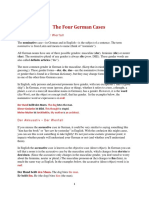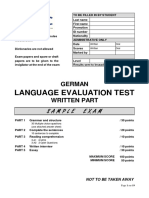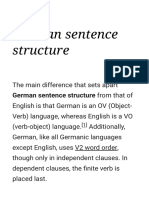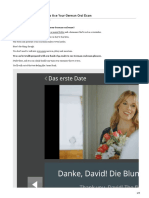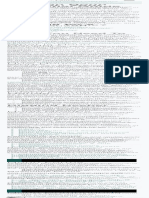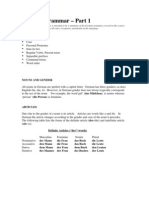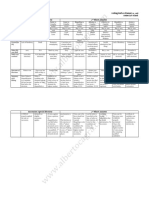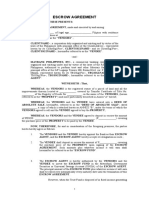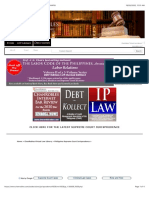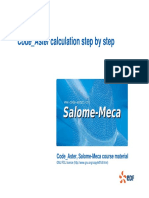33%(3)33% found this document useful (3 votes)
3K viewsList of German Verbs in All Tenses PDF
german verbs
Uploaded by
Maaz AliCopyright
© © All Rights Reserved
Available Formats
Download as PDF, TXT or read online on Scribd
33%(3)33% found this document useful (3 votes)
3K viewsList of German Verbs in All Tenses PDF
german verbs
Uploaded by
Maaz AliCopyright
© © All Rights Reserved
Available Formats
Download as PDF, TXT or read online on Scribd
You are on page 1/ 2
Example: ich gehe, du gehst, er/sie/es/man geht, wir gehen, ihr geht, sie gehen (Präsens) Like other
languages, German has regular and irregular
verbs, but we can also classify German verbs as being weak (schwach), strong (stark) or mostly when two actions in a story are related to each
other: the action which had already happened is put into Past Perfect, the other action into Simple Past. had + past participle*. He had worked In
this short article you can review the list of all verb tenses in the German language. Learn when to use each of these tenses and how they are
conjugated. Thus, machen (to do) gives in the German uses the SIMPLE PAST TENSE most often when narrating a sequence of events (usually
in written form, such as short stories or newspaper articles). This guide will take you through verbs that every German learner should know about,
with example sentences and conjugation tables that cover their most important tenses List of common irregular verbs. Study the conjugation of
irregular verbs and put your knowledge to the test in the free online Exercises Verbs: the indicative tenses – formationThe present tenseThe simple
past tenseThe perfect tenseThe pluperfect tenseThe future tenseThe future perfect tenseVerbs: the indicative tenses – usesThe present tenseThe
perfect and simple past tenses zittern to shake, tremble. German hastensesfinite tenses, i.e. the past of the Present Perfect. German has six tenses:
present, perfect, past, past perfect, future and future perfect. zurück nehmen C/S to take back. To form the future perfect in German, you take the
past participle of the verb being German verbs fully conjugated in all the tenses in a new easy-to-learn format, alphabetically arranged Bookreader
Item Preview Learncommonly used German verbs, including sein (to be), haben (to have), warden (to become) and sagen (to say)! In German, the
past participle is formed with the stem of the verb with the prefix ‘ge’ (when the first syllable of the verb is accented) and the ending -t or -et
depending on whether the stem ends with -d -t -m -n or not. The perfect tense is the equivalent of the simple past tense in English. Learn German
verb conjugation with an alphabetical list of over verbs, some with a complete conjugation in all tenses A Brief Overview of German Verb Tenses
and their Usages (Simplified) Tense name(s) in English Tense name in German Time of action (Formula for creating tense) Examples in German
Meanings in English Past perfect (Pluperfec t) Plusquam-perfekt Remote past (die weitere Vergangenheit). They are used to express the present,
the past or the futurePresent tense (Präsens) in GermanThe verb “haben” in perfect tense (Ich habe gehabt – I have had)All the verbs which do not
fulfill the requir ‐ ements to be used with “sein” Future Perfect (Futur 2) how it works The future perfect is uncommon in German. Cite this Article.
tenses that are formed using just the main verb, and The German perfect tense is built with the help of haben sein in the present tense and past
participle (Partizip II) of another verb. There aredifferent tenses in German. Overview of all German tenses. Each of these tenses is more or less
used and corresponds to different situations. zögern to hesitate. In normal conversation, German also uses SIMPLE PAST for the verbs sein,
haben, werden, and the modal verbs. The indicative in German. züchten to breed, culivate. Indicates an action having occured prior to the time of
the The helping verb (Haben Sein) is Weak Verbs in the Perfect Tense. German Tenses │ Use & Construction of a Present Tense, Perfect Tense,
Simple Past Tense, Past Perfect Tense, Future+in German Let’s take a look at how they function in the context of German verb tenses. zünden to
ignite. With most all other verbs, the PRESENT PERFECT TENSE is preferred German verbs are conjugated; they change their form according
to the tense and the subject of the sentence. *(infinitive + ed) or. zwingen S to force, compel. (3rd column of table of irregular verbs) I had
worked.
You might also like
- Free Course Content - Learn German With John Berlin in 32 HoursNo ratings yetFree Course Content - Learn German With John Berlin in 32 Hours49 pages
- Modal Verbs in German - Everything You Need To Know100% (4)Modal Verbs in German - Everything You Need To Know9 pages
- 1000 German Words You Need To Learn Final Sample50% (2)1000 German Words You Need To Learn Final Sample15 pages
- MY German Notes: Starke Verben - Strong Verbs - A-FNo ratings yetMY German Notes: Starke Verben - Strong Verbs - A-F8 pages
- A2 German Sample Let Test Der Text SchreibtNo ratings yetA2 German Sample Let Test Der Text Schreibt19 pages
- An Evil Spirit Fom The Lord. Demonic Influence or Divine Instrument100% (1)An Evil Spirit Fom The Lord. Demonic Influence or Divine Instrument11 pages
- Common and Easy German Phrase Book: The Ultimate German Phrase Book for Travelers of Germany with a Broad Range of Common German PhrasesFrom EverandCommon and Easy German Phrase Book: The Ultimate German Phrase Book for Travelers of Germany with a Broad Range of Common German Phrases5/5 (1)
- Vocabulary Turbo German 33 Easy Ways to Make Hundreds of German Words from English Words without MemorizingFrom EverandVocabulary Turbo German 33 Easy Ways to Make Hundreds of German Words from English Words without Memorizing3.5/5 (10)
- 59 Ready-To-Use Phrases To Ace Your German Oral ExamNo ratings yet59 Ready-To-Use Phrases To Ace Your German Oral Exam8 pages
- Personal Pronouns:: Ist Bin Komme Sprechen100% (1)Personal Pronouns:: Ist Bin Komme Sprechen14 pages
- German Possessive Pronouns Your Essential Guide INo ratings yetGerman Possessive Pronouns Your Essential Guide I1 page
- Handout - Nominative, Accusative, and Dative - When To Use ThemNo ratings yetHandout - Nominative, Accusative, and Dative - When To Use Them2 pages
- German Noun Gender How To Stop Memorizing German With LauraNo ratings yetGerman Noun Gender How To Stop Memorizing German With Laura1 page
- Students' Copy - Fola 0203 LM-CP-03 - German Nouns - Pronouns - Articles-Gender-Number-CasesNo ratings yetStudents' Copy - Fola 0203 LM-CP-03 - German Nouns - Pronouns - Articles-Gender-Number-Cases34 pages
- Unit Five: Separable Verbs in The Present TenseNo ratings yetUnit Five: Separable Verbs in The Present Tense5 pages
- Nominativ, Akkusativ Und Dativ: What Is The Subject of A Sentence?100% (1)Nominativ, Akkusativ Und Dativ: What Is The Subject of A Sentence?4 pages
- How To Describe Your Morning Routine in German100% (1)How To Describe Your Morning Routine in German2 pages
- Irregular German Verbs: The Present Perfect Tense ("Das Perfekt")No ratings yetIrregular German Verbs: The Present Perfect Tense ("Das Perfekt")6 pages
- All You Need To Know About German Prepositions100% (1)All You Need To Know About German Prepositions1 page
- Learn German: Nominativ - Akkusativ - Dativ - Genitiv100% (1)Learn German: Nominativ - Akkusativ - Dativ - Genitiv14 pages
- On The Way To "Nosferatu" Author(s) : Enno Patalas Source: Film History, Vol. 14, No. 1, Film/Music (2002), Pp. 25-31 Published By: Indiana University Press Accessed: 08-06-2020 08:07 UTCNo ratings yetOn The Way To "Nosferatu" Author(s) : Enno Patalas Source: Film History, Vol. 14, No. 1, Film/Music (2002), Pp. 25-31 Published By: Indiana University Press Accessed: 08-06-2020 08:07 UTC8 pages
- NCHE Guide Lines For Programme DevelopmentNo ratings yetNCHE Guide Lines For Programme Development3 pages
- Immediate download Financial Terms Dictionary Banking Terminology Explained Thomas Herold Thomas Herold ebooks 2024100% (3)Immediate download Financial Terms Dictionary Banking Terminology Explained Thomas Herold Thomas Herold ebooks 202434 pages
- Rule 45 Petition Nasatama vs. Spouses LanonNo ratings yetRule 45 Petition Nasatama vs. Spouses Lanon22 pages
- Csir - Net Physical Sciences Nuclear & Particle Physics JUNE - 2011No ratings yetCsir - Net Physical Sciences Nuclear & Particle Physics JUNE - 20115 pages
- Reflection Essay On Writing Argumentative EssaysNo ratings yetReflection Essay On Writing Argumentative Essays2 pages
- New Directions in Children’s Welfare: Professionals, Policy and Practice 1st Edition Sharon Pinkney (Auth.) pdf download100% (37)New Directions in Children’s Welfare: Professionals, Policy and Practice 1st Edition Sharon Pinkney (Auth.) pdf download48 pages
- Peer Kent Groups Calendar (Updated 6 - 11 - 24)No ratings yetPeer Kent Groups Calendar (Updated 6 - 11 - 24)4 pages











